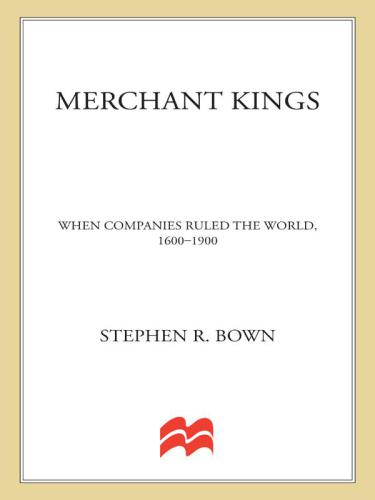
Merchant Kings
When Companies Ruled the World, 1600--1900
کتاب های مرتبط
- اطلاعات
- نقد و بررسی
- دیدگاه کاربران
نقد و بررسی

Starred review from October 25, 2010
Bown (A Most Damnable Invention) has produced a magnificent description of the six great companies, and their leaders, that dominated the "Heroic Age of Commerce." Bown demonstrates how the corporations served as stalking horses for kings and parliaments while enriching shareholders and the powerful managers themselves. Jan Pieterszoon Coen of the Dutch East India Company was particularly noteworthy for cruel tyranny in what is now Indonesia. The English East India Company's Robert Clive, through genius and perseverance, rose to a position of near-absolute power in India. Aleksander Baranov of the Russian American Company, known as the "Lord of Alaska," was bound by ties of decency and responsibility to the company's men, but also had a deep strain of brutality. Cecil Rhodes of the British South Africa Company and of De Beers, the South African diamond monopoly, was dedicated both to the British Empire and to the success of his various enterprises. Bown presents a fascinating look at the men who exploited resources and native peoples while laying the foundations of empires. "Neither heroes nor angels," Bown says, their global impact was as great as that of any king. Illus.; maps.

October 1, 2010
A vivid popular history of the great commercial monopolies that helped shape the modern world.
For three centuries, beginning in the early 1600s, European powers granted monopoly trading rights to joint-stock corporations, such as the Dutch East India Company, as a way to bankroll colonial expansion. Bown (Madness, Betrayal and the Lash: The Epic Voyage of Captain George Vancouver, 2009, etc.) relates the rousing story of a half-dozen of these companies and the "larger-than-life merchant-adventurers" who led them. Beginning as traders, these leaders, many with their own armies, were not subject to the laws of their home nations or of local governments. With authority to pass laws, collect taxes and wage war with foreign princes, they did as they pleased, "with free rein to indulge their impulses, impose dictatorial power and plunder rapaciously. They were competitive and ruthless, often battling companies from other European nations to gain trading footholds. Most readers will be familiar with Peter Stuyvesant (Dutch West India Company), the stern, one-legged ruler of New Amsterdam; and the arrogant, racist Cecil Rhodes (British South Africa Company), who made his fortune operating in Rhodesia for England. But Bown portrays others as well, including strongman Jan Pieterszoon Coen (Dutch East India Company), who had 150 merchant ships and 40 warships, controlled the global spice supply and believed that violent force alone ensured profitability; Robert Clive (English East India Company), who carefully cultivated his heroic image after military victories in India; Aleksandr Andreyevich Baranov (Russian American Company), whose aggressive 28-year rule over Russian Alaska delivered profits from sea otter furs to investors in St. Petersburg; and the "sexist, racist, domineering braggart" George Simpson (Hudson's Bay Company), who traveled in a canoe, wearing a top hat, as he built an empire of beaver furs that helped give rise to Canada. Hardly a pleasant group, these manipulative leaders' companies grew so large and indispensable to their home nations that they sometimes required government bailouts.
An absorbing tale of unfettered commerce.
(COPYRIGHT (2010) KIRKUS REVIEWS/NIELSEN BUSINESS MEDIA, INC. ALL RIGHTS RESERVED.)

December 1, 2010
From the tangled histories of the giant trading companies of the past, Bown (A Most Damnable Invention: Dynamite, Nitrates, and the Making of the Modern World) presents six of the most important figures: Jan Coen (Dutch East India Company), Peter Stuyvesant (Dutch West India Company), Robert Clive (British East India Company), Alexander Baranov (Russian-American Company), George Simpson (Hudson's Bay Company), and Cecil Rhodes (British South Africa Company). The monopolistic status of these companies, driven to maximize profits, meant that each became the sole power in its territory and an unofficial extension of its country's government, taking on duties of colonization and legal and martial powers. The leaders of these companies gained enormous influence to pursue their own goals, whether driven by personal avarice, nationalistic pride, or a need for control. Bown provides accurate summations of each man's life and motivations, but his focus is on how the ambitions of these men combined with the force of commerce to alter history as much as any legitimate monarch did. VERDICT Bown's treatment of each individual is succinct, so those wanting an in-depth study should look elsewhere. General readers interested in embarking on this subject will find this an excellent starting point.--Kathleen McCallister, Univ. of South Carolina, Columbia, Lib.
Copyright 2010 Library Journal, LLC Used with permission.

November 15, 2010
Monopolies, such as Englands storied East India Company, have inspired many popular histories and biographies. Bown synthesizes this material into a lively gallery of six men who built up their firms and enriched themselves. Motivations and character are in the forefront of Bowns portraits, whose subjects viewed their employment as their main chance for ascending to status and wealth, manifesting traits of determination and ruthlessness along the way that posterity looked upon askance, to put it mildly. Take Cecil Rhodes, the racial-supremacist empire builder who organized a company to dispossess Africans from what is today Zimbabwe and Zambia. Bown compares Rhodes to Jan Coen, who in the early 1600s pitilessly monopolized the East Indies spice trade on behalf of the Netherlands and his company, the VOC, and counts Robert Clive in 1700s India as a comparable buccaneer of self-interest and imperial expansion. Additionally profiling Pieter Stuyvesant in New York, Aleksandr Baranov in Alaska, and George Simpson of the Hudsons Bay Company, Bown ably deploys biography to present the successes, costs, and legacies of an eras commingling of private money and state sovereignty.(Reprinted with permission of Booklist, copyright 2010, American Library Association.)

























دیدگاه کاربران